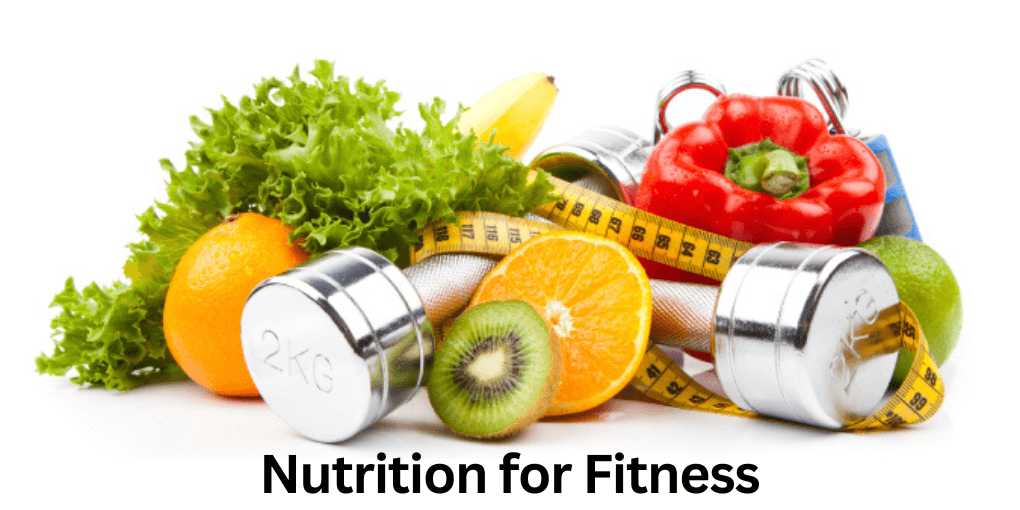Discover the power of proper nutrition for fitness and unlock your body’s potential with our comprehensive guide.

Enhance your workouts and recovery with our comprehensive guide to nutrition for fitness, featuring practical tips and meal plans.
In the pursuit of optimal performance and achieving fitness goals, nutrition plays a crucial role.
Properly fueling your body with the right nutrients can enhance your energy levels, support muscle growth and recovery, and improve overall athletic performance.
This article will delve into the importance of nutrition for fitness and provide insights into pre-workout, during-workout, and post-workout nutrition strategies, along with guidance on optimizing performance through supplements and tailoring nutrition to specific goals.
Table of Contents
ToggleUnderstanding Nutrition for Fitness
Understanding nutrition for fitness is essential for optimizing your performance, supporting muscle growth and recovery, and maintaining overall health. Here are key aspects to consider:
Micronutrients
Micronutrients, including vitamins and minerals, are vital for various bodily functions and exercise performance.
Consume a diverse range of fruits, vegetables, whole grains, lean proteins, and dairy or dairy alternatives to ensure an adequate intake of micronutrients.
Consider consulting with a registered dietitian to address any specific micronutrient needs based on your fitness goals and individual requirements.
Pre-Workout Nutrition
Fueling your body properly before workouts is crucial for optimal performance.
Consume a balanced meal or snack that includes carbohydrates for energy, proteins for muscle support, and a small amount of healthy fats.
Timing and portion sizes may vary based on personal preference and digestion rates but aim to have a pre-workout meal or snack 1-3 hours before exercise.
Post-Workout Nutrition
After workouts, prioritize post-workout nutrition to support muscle recovery and replenish glycogen stores. Include a combination of carbohydrates and proteins within 30-60 minutes of exercise.
Carbohydrates help restore energy levels, while proteins aid in muscle repair and growth.
This can be achieved through a balanced meal or a post-workout snack such as a protein shake with added carbohydrates.
Hydration
Staying hydrated is crucial for exercise performance and overall health.
Drink water regularly throughout the day, and ensure adequate hydration before, during, and after workouts.
The exact fluid needs depend on factors like activity level, environmental conditions, and individual sweat rates.
Monitor your urine color as a general indicator of hydration, aiming for a pale yellow color.
The Importance of Nutrition for Performance
- Energy Production: Proper nutrition provides the energy needed for physical activity.
- Carbohydrates: Carbs are the primary source of energy and fuel for workouts.
- Muscle Repair and Growth: Protein is essential for repairing and building muscles.
- Nutrient Timing: Properly timing nutrient intake can enhance performance.
- Pre-Workout Fuel: Consuming carbohydrates and protein before exercise optimizes energy levels.
- Post-Workout Recovery: Consuming carbs and protein after exercise aids in muscle repair and glycogen replenishment.
- Hydration: Proper hydration is crucial for optimal performance and prevents fatigue.
- Electrolyte Balance: Electrolytes help maintain fluid balance and muscle function.
- Mental Focus: Nutrition impacts cognitive function and mental focus during exercise.
- Balanced Meals: A balanced diet supports brain health and cognitive performance.
Pre-Workout Nutrition
Timing and Composition of Pre-Workout Meals
The timing of your pre-workout meal or snack is essential to provide adequate fuel for your exercise session.
Aim to consume your meal or snack 1 to 3 hours before your workout to allow for digestion and nutrient absorption.
When it comes to the composition of your pre-workout meal, focus on a balance of carbohydrates and proteins.
Carbohydrates provide a readily available source of energy, while proteins help support muscle integrity and repair.
Include complex carbohydrates like whole grains, fruits, and vegetables in your pre-workout meal.
These carbohydrates release energy slowly, providing a sustained fuel source during your workout.
Additionally, opt for lean protein sources such as chicken, fish, tofu, or Greek yogurt to provide the necessary amino acids for muscle support.
Hydration for Optimal Performance
Hydration is vital for optimal performance during your workout. Dehydration can result in decreased stamina, weariness, and deteriorated mental performance.
Ensure you are adequately hydrated before you start your exercise session.
It’s recommended to drink water or a sports drink containing electrolytes before your workout.
Electrolytes, such as sodium, potassium, and magnesium, help maintain fluid balance and aid in muscle function.
If you’re engaging in intense or prolonged exercise, consider a sports drink that contains both carbohydrates and electrolytes to replenish energy stores and maintain hydration.
Remember to listen to your body and drink according to your thirst levels.
Sip water throughout your pre-workout period to ensure you start your session well-hydrated.
Post-Workout Nutrition
Importance of Post-Workout Nutrition
The post-workout period is a critical window for replenishing glycogen stores, repairing muscle tissue, and initiating the recovery process.
Consuming the right nutrients after exercise helps optimize muscle recovery, reduce muscle soreness, and enhance overall adaptation to training.
Protein for Muscle Recovery
Protein is crucial for repairing and rebuilding muscle tissue damaged during exercise.
Consuming a protein-rich meal or snack post-workout provides the necessary amino acids to promote muscle protein synthesis and accelerate recovery.
Refueling with Carbohydrates
In addition to protein, replenishing glycogen stores is essential after exercise.
Consuming a combination of carbohydrates and protein within the post-workout period helps maximize glycogen resynthesis and muscle recovery.
Optimizing Performance with Supplements
Whey Protein
Whey protein supplements are a popular choice for athletes and fitness enthusiasts due to their high-quality amino acid profile and rapid digestion.
Whey protein can aid in muscle recovery and growth when consumed post-workout or as a convenient snack throughout the day.
Creatine
A naturally occurring substance called creatine can be found in trace amounts in several meals.
It helps regenerate ATP (adenosine triphosphate), the primary energy source for muscle contractions.
Creatine supplementation can enhance strength, power, and performance in high-intensity activities.
BCAA (Branched-Chain Amino Acids)
Leucine, isoleucine, and valine are among the essential amino acids collectively known as BCAAs.
They play a vital role in muscle protein synthesis and can help reduce muscle breakdown during intense exercise.
BCAA supplementation may be beneficial for endurance athletes or those engaged in prolonged resistance training.
Tailoring Nutrition to Specific Goals
Tailoring nutrition to specific goals allows individuals to optimize their dietary choices based on their unique objectives. Here are key considerations for different goals:
Weight Loss
- Caloric Deficit: Create a calorie deficit by consuming fewer calories than you expend.
- Portion Control: Keep an eye on serving sizes and eat slowly.
- Balanced Macronutrients: Include a mix of carbohydrates, proteins, and healthy fats to support satiety and nutrient intake.
- Fiber-Rich Foods: Choose high-fiber foods to promote feelings of fullness.
- Hydration: Maintaining proper hydration is important before, during, and after exercise.
- Nutrient Density: Focus on nutrient-dense foods to meet nutrient needs while limiting calorie intake.
Muscle Gain
- Caloric Surplus: Consume a slight caloric surplus to support muscle growth.
- Protein Intake: Increase protein consumption to support muscle repair and synthesis.
- Resistance Training: Engage in regular strength training to stimulate muscle growth.
- Carbohydrates for Energy: Include sufficient carbohydrates to fuel workouts and support recovery.
- Healthy Fats: Include sources of healthy fats to support hormone production and overall health.
- Timing: Distribute protein and carbohydrate intake evenly throughout the day, including pre-and post-workout meals/snacks.
Endurance Performance
- Carbohydrate Focus: Prioritize carbohydrates to fuel endurance workouts and maintain glycogen stores.
- Hydration:Keep yourself properly hydrated before, during, and after exercise.
- Electrolyte Balance: Consume electrolyte-rich foods or drinks to support fluid balance and muscle function.
- Nutrient Timing: Consider pre-workout meals/snacks to optimize energy levels and post-workout nutrition for glycogen replenishment and muscle recovery.
- Balanced Diet: Ensure a well-rounded diet with a mix of carbohydrates, proteins, and healthy fats to meet overall nutrient needs.
General Health and Well-being:
- Balanced Diet: Eat a range of nutrient-dense foods, such as fruits, vegetables, whole grains, lean meats, and healthy fats, as part of a balanced diet
- Micronutrient Intake: Ensure adequate intake of vitamins and minerals through a diverse diet or consider supplements if needed.
- Hydration: Drink sufficient water throughout the day to support overall health.
- Mindful Eating: Practice mindful eating, focusing on hunger and fullness cues, and enjoying the eating experience.
- Limit Processed Foods: Minimize the consumption of processed and sugary foods, and choose whole foods whenever possible.
Remember that individual needs and goals may vary, so it’s essential to consult with a registered dietitian or healthcare professional who can provide personalized guidance tailored to your specific goals and circumstances.
Conclusion
In conclusion, nutrition plays a vital role in fueling your body for optimal performance in fitness activities.
By understanding the importance of nutrition and tailoring it to your specific goals, you can enhance your energy levels, support muscle growth and recovery, and improve overall athletic performance.
Prioritize pre-workout nutrition by consuming a balanced meal or snack that includes carbohydrates and proteins.
This provides the necessary fuel and building blocks for your exercise session.
Hydration before workouts is also crucial to maintain performance and prevent dehydration.
During workouts, focus on staying hydrated by drinking water and electrolyte-containing beverages.
Fuel your body with carbohydrates to sustain energy levels, and consider the use of sports drinks or energy gels for longer or more intense sessions.




